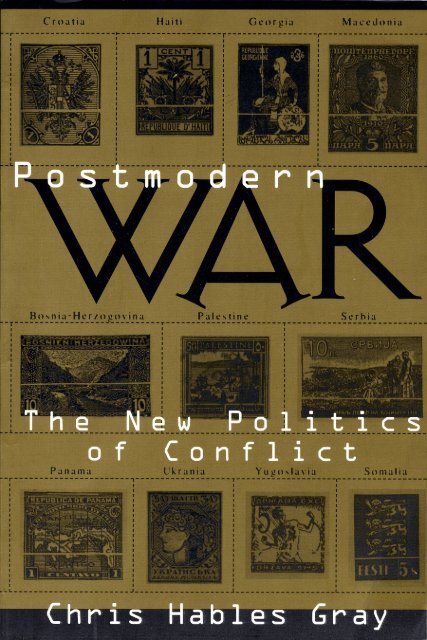postmodern war - Chris Hables Gray
postmodern war - Chris Hables Gray
postmodern war - Chris Hables Gray
You also want an ePaper? Increase the reach of your titles
YUMPU automatically turns print PDFs into web optimized ePapers that Google loves.
POSTMODERN WAR
CRITICAL PERSPECTIVES<br />
A Guilford Series<br />
DOUGLAS KELLNER, Editor<br />
University of Texas at Austin<br />
A THEORY OF HUMAN NEED<br />
Len Doyal and Ian Gough<br />
POSTMODERN THEORY: CRITICAL INTERROGATIONS<br />
Steven Best and Douglas Kellner<br />
PSYCHOANALYTIC POLITICS, SECOND EDITION: JACQUES LACAN<br />
AND FREUD'S FRENCH REVOLUTION<br />
Sherry Turkle<br />
POSTNATIONAL IDENTITY: CRITICAL THEORY AND EXISTENTIAL PHILOSOPHY<br />
IN HABERMAS, KIERKEGAARD, AND HAVEL<br />
Martin J. Matustik<br />
THEORY AS RESISTANCE: POLITICS AND CULTURE AFTER (POST)STRUCTURALISM<br />
Mas'ud Zavarzadeh and Donald Morton<br />
POSTMODERNISM AND SOCIAL INQUIRY<br />
David R. Dickens and Andrea Fontana, Editors<br />
MARXISM IN THE POSTMODERN AGE: CONFRONTING THE NEW WORLD ORDER<br />
Antonio Callari, Stephen Cullenberg, and Carole Biewener, Editors<br />
AFTER MARXISM<br />
Ronald Aronson<br />
THE POLITICS OF HISTORICAL VISION: MARX, FOUCAULT, HABERMAS<br />
Steven Best<br />
ROADS TO DOMINION: RIGHT-WING MOVEMENTS AND POLITICAL POWER<br />
IN THE UNITED STATES<br />
Sara Diamond<br />
LEWIS MUMFORD AND THE ECOLOGICAL REGION: THE POLITICS OF PLANNING<br />
Mark Luccarelli<br />
SIGN WARS: THE CLUTTERED LANDSCAPE OF ADVERTISING<br />
Robert Goldman and Stephen Papson<br />
REVOLUTION OF CONSCIENCE: MARTIN LUTHER KING, JR.,<br />
AND THE PHILOSOPHY OF NONVIOLENCE<br />
Greg Moses<br />
POSTMODERN WAR<br />
<strong>Chris</strong> <strong>Hables</strong> <strong>Gray</strong>
POSTMODERN WAR<br />
THE NEW POLITICS OF CONFLICT<br />
<strong>Chris</strong> <strong>Hables</strong> <strong>Gray</strong><br />
THE GUILFORD PRESS<br />
New York London
© 1997 The Guilford Press<br />
A Division of Guilford Publications, Inc.<br />
72 Spring Street, New York, NY 10012<br />
All rights reserved<br />
No part of this book may be reproduced, stored in a retrieval system, or<br />
transmitted, in any form or by any means, electronic, mechanical,<br />
photocopying, microfilming, recording, or otherwise, without written<br />
permission from the Publisher.<br />
Printed in the United States of America<br />
This book is printed on acid-free paper.<br />
Last digit is print number: 9 8 7 6 5 4 3 2 1<br />
Library of Congress Cataloging-in*Publication Data<br />
<strong>Gray</strong>, <strong>Chris</strong> <strong>Hables</strong><br />
Postmodern <strong>war</strong>: the new politics of conflict / <strong>Chris</strong> <strong>Hables</strong> <strong>Gray</strong>.<br />
p. cm.—(Critical perspectives)<br />
Includes bibliographical references and index.<br />
ISBN 1-57230460-0 (hard).—ISBN 1-57230-176-7 (paper)<br />
1. World politics—1989-. 2. War—Forecasting. 3. Military<br />
history, Modern—20th century. 4- War—Psychological aspects.<br />
I. Title. II. Series: Critical perspectives (New York, N.Y)<br />
D860.G75 1997<br />
306.6'6—dc21 97-1538<br />
CIP
To Carl Harp, cofounder of Men Against Sexism,<br />
Walla Walla Federal Penitentiary. Dead of state terrorism.<br />
Love and rage, Carl.
Preface<br />
wlile the arguments of this book may seem contentious, they actually<br />
rest on many agreements. I agree with Noam Chomsky that there is "a<br />
persistent fair probability of nuclear <strong>war</strong>" (1986, p. 39). I agree with Richard<br />
Lebow and Janice Stein that we all lost the Cold War (1994), although we<br />
did win the one thing that we needed most, time. I agree with many specific<br />
things that historians and others have said, and I cite them at length in this<br />
book. But there are a number of intellectual dogmas that I don't ascribe to.<br />
I reject simplistic accounts of the Cold War, and of all <strong>war</strong>s. In the book<br />
that follows I challenge much received wisdom. If you disagree, I'd love to<br />
hear from you. Write me care of this publisher.<br />
There is one dogma, of the history profession, that I want to challenge<br />
here in the Preface, as it is a meta-issue not really addressed in the main text.<br />
It has to do with the idea of progress. I believe in progress, of a sort, even<br />
though history has its cycles. History does repeat itself, as tragedy and farce,<br />
but not always. New things happen. Many historians argue against the idea<br />
that history can be progressive; that it is going somewhere. But I disagree<br />
with them. There are patterns we can see that clearly show a kind of progress,<br />
if we remember that love and cancer both progress, grow, and spread.<br />
Technoscience, and the human impact on nature, where we can see progress<br />
of some type clearly, is obviously a mixture of healthy growth and something<br />
else. War is part of that something else. This is an account of its progress.<br />
It is contested as are all stories. There is a place for stories in academia<br />
(Cronon 1992) and you will see that I mainly think in stories. For me, there<br />
are stories in everything. For example, I have dedicated this book to Carl<br />
Harp. Now there's a story, several stories. There's a story about Carl Harp,<br />
the beautiful anarchist activist who formed a Men Against Sexism group in<br />
prison and who was eventually murdered by the forces of order, as he called<br />
[ vii ]
[ vijj ] Preface<br />
them. I was fortunate enough to meet Carl a few times, and learned a great<br />
deal from him. And there is a story to the dedication itself.<br />
Originally I dedicated this book to another wonderful person, a deciparacida<br />
in South America, presumed long dead in Argentina's Dirty War.<br />
But then, years later as this book was in press, I discovered he had recently<br />
come out of hiding in exile and that he had survived. So, a happy ending, in<br />
part. Just as <strong>war</strong> has its happy moments, especially in the stories of those who<br />
seek to end it.<br />
The nature of these forces who seek to wage peace is an important part<br />
of the story of our present. The incredible mobilizations of women in<br />
countries as different as South Africa and Bosnia is one crucial example, and<br />
another happy story in the larger sad one of <strong>war</strong> (Lederer, 1995). I discuss<br />
peace activism at length to<strong>war</strong>ds the end of this book because it is part of the<br />
<strong>war</strong> story, as much as the effectiveness of machine guns or the madness of<br />
mutually assured destruction. There are many stories.<br />
Science, which has offered us so many difficult tests in the area of <strong>war</strong>,<br />
also offers us one of these happy stories, hope in the power of life. Whether<br />
or not Rock 84001 really has signs of ancient life from Mars, the hope it offers<br />
is real. We might find life on other planets. We might have already. We might<br />
make peace on our planet. Peace could be breaking out all over. There is<br />
always hope, where there is life. Life writes stories just by living. Humans<br />
have formalized this, of course. Hence this book. I hope it holds your<br />
attention.<br />
LOVE AND RAGE,<br />
CHRIS HABLES GRAY, 8/16/96
Acknowledgments<br />
I would to first thank Donna Haraway, my mentor. She is an inspiration. I<br />
would also like to sincerely thank the other members of my dissertation<br />
committee: Barbara Epstein, Terry Winograd, and Bruce Larkin, for their<br />
support and advice. Billie Harris, the administrator of the History of Consciousness<br />
Board during my time there, was an invaluable help, a steadfast<br />
supporter, and a good friend. Everyone at HistCon deserves thanks. It is a<br />
unique, wonder-filled program and a weird but real community. But I would<br />
especially like to mention Hayden White, Jim Clifford, and my good friends<br />
Zoe Sofia, Paul Ed<strong>war</strong>ds, Sharon Helsel, Noel Sturgeon, Sarah Williams, and<br />
Ron Eglash. Everyone in our Cultural Studies of Science and Technology<br />
Research Group has been helpful, thoughtful, and amusing, especially Mark<br />
Driscoll<br />
I owe a great deal to the faculty and students I've worked with at the<br />
University of California, Santa Cruz, and in other places as distant as<br />
Moscow, but I don't have space to name them all here. I also must thank the<br />
Institute on Global Conflict and Cooperation of the University of California<br />
at San Diego, the Universitiy of California Regents, the Eisenhower Fellowships,<br />
and the Smithsonian Institution for funding support. Paul Ceruzzi of<br />
the Smithsonian was a kind and gracious host during my summer there. James<br />
Der Derian as a commentator and Les Levidow, an editor, helped me improve<br />
this book a great deal, as did Hugh Gusterson, a fine friend and a fine reader.<br />
Of course all errors are my responsibility.<br />
Finally, I could not have done this work without my friends and<br />
family. Jane, Corey, Zachary, Mary <strong>Hables</strong>, the Wilsons, the <strong>Gray</strong>s, and all<br />
my companeros, you know who you are, thank you!








